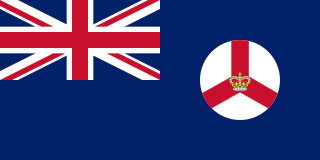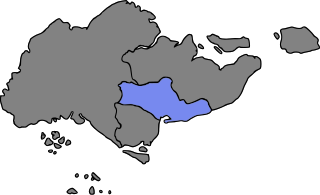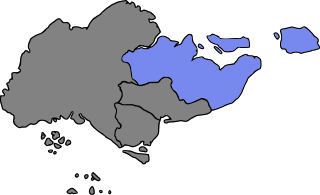
The City of Singapore existed between 1951 and 1965 in the Colony of Singapore, a British Crown colony and later in the State of Singapore within Malaysia, with the City Council as the governing authority. Before 1951, the City Council was known as the Municipal Commission. The rest of the crown colony was under the authority of the Singapore Rural Board. The city served as the capital of Colony of Singapore, and the State of Singapore from 1951 until its abolishment in 1965.

General elections were held for the first time in Singapore on 20 March 1948, when six of the 22 seats on the Legislative Council became directly-elected.

General elections were held in Singapore on 10 April 1951 to elect members to nine seats in the Legislative Council, up from six seats in the 1948 elections. A 32-day-long campaign period was scheduled, with nomination day on 8 March 1951. The result was a victory for the Progressive Party, which won six of the nine seats.

The Colony of Singapore was a Crown colony of the United Kingdom that encompassed what is modern-day Singapore from 1946 to 1958. During this period, Christmas Island, the Cocos (Keeling) Islands, and Labuan were also administered from Singapore. Singapore had previously been established as a British colony since 1824, and had been governed as part of the Straits Settlements since 1826. The colony was created when the Straits Settlements was dissolved shortly after the Japanese occupation of Singapore ended in 1945. The power of the British Government was vested in the governor of Singapore. The colony eventually gained partial internal self-governance in 1955, and lasted until the establishment of the State of Singapore in 1958, with full internal self-governance granted in 1959.
This local electoral calendar for 2016 lists the subnational elections held in 2016. Referendums, retention elections, and national by-elections are also included.
KatongConstituency was a constituency in Singapore from 1951 until 1959 and from 1968 until 1984.
Rochore Constituency was a constituency in Singapore that existed from 1951 until 1988. The constituency was represented in the Legislative Council from 1951 until 1955, in the Legislative Assembly from 1955 until 1965, and in Parliament from 1965 until 1988. It elected one member of Parliament.

The Labour Party was a political party in Singapore.
The 1948 Rural West by-election for the Legislative Council of Singapore was held on 16 October 1948, after the death of incumbent Srish Chandra Goho on 24 July 1948. Independent candidate Balwant Singh Bajaj was elected with 56% of the vote, taking his seat on 19 October 1948.

Tan Chye Cheng, also known as C. C. Tan, was a Singaporean lawyer and politician.

Arumugam Ponnu Rajah, also known as A. P. Rajah, was a Singaporean judge, diplomat and politician. He served as Speaker of the Parliament of Singapore between 1964 and 1966 becoming the first speaker after independence, as Singapore High Commissioner to the United Kingdom and later Singapore High Commissioner to Australia, and thereafter on the Supreme Court. He was Singapore's first Supreme Court judge to remain on the bench after turning 70.

Municipal North-East was a constituency represented in the Legislative Council of Singapore from 1948 until 1951. It elected two Legislative Council members.

Rural East Constituency was a constituency represented in the Legislative Council of Singapore from 1948 until 1951. It elected one Legislative Council member.

Rural West Constituency was a constituency represented in the Legislative Council of Singapore from 1948 until 1951. It elected one Legislative Council member.
City Constituency was a constituency represented in the Legislative Council of Singapore from 1951 until 1955. The constituency was formed in 1951 from carving out from Municipal South-West Constituency and in 1955, it was split into Havelock, Stamford, Tanjong Pagar and Telok Ayer constituencies.
Keppel Constituency was a constituency represented in the Legislative Council of Singapore from 1951 until 1955. It elected one Legislative Council member. The constituency was held by Lim Yew Hock, leader of the Labour Party.
This local electoral calendar for 2023 lists the subnational elections held in 2023. Referendums, recall and retention elections, and national by-elections are also included.










